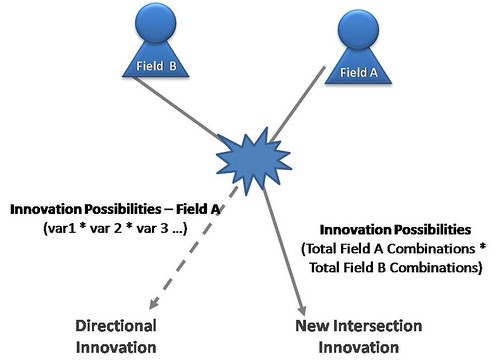Innovation at the Intersection

I have referred to the Medici Effect in a couple recent posts (here and here), and figured I should post a review/summary of the book. The term Medici comes from a banking family by that name in 15 century Florence Italy. This family and a few others began to sponsor creators from a vast array of fields, which caused people with wildly different skills to come to Florence. Their they found each other, learned from each other and broke down barriers between disciplines and cultures. Together they created a new world based on ideas generated, which became known as the Renaissance.
The author Frans Johansson, does an excellent job looking at intersection innovation and how it can be applied to todays innovators. For me the difference between a good book and a great book is how much it keeps me thinking after I put it down. This was one of those books. I kept a notebook with me as the concepts actually caused me to think about things differently generated new ideas on concepts I have been mulling around in my head.
Everything is connected in one way or another. The trick is seeing how these things connect and how to use it. It actually goes against the grain suggesting specialization in a given field is not the best way to produced breakthrough innovation. Field specialization will produce directional innovation. In many fields directional innovation is drying up. All the relevant variables have been combined. We actually have a great chance of achieving ground breaking innovating by not specializing in just a single field of study/work.
If you have two different fields (A, B) and each field has a number of variables to play with your innovation potential in each field is
Innovation potential of A= x1*x2*x3*xn
Innovation potential of B= y1*y2*y3*yn
If you take two different fields of study and combine all the possible variables, your innovation potential has grown dramatically. You now have A*B possible combinations many of which have likely never even been thought about together.
Its not that you can just know a little about many fields - you still need to have some level of depth, but the key is applying concepts from one field to another, and then another etc. How do you do this? Well the book has many suggestions, but one simple way is to begin exposing yourself to different industries. Possibly take a job in a new field, or minimally just studying across different fields and begin to draw parallels with your current specialty areas.
Once change you will see on this blog going forward is that I will begin injecting books into my reading list that will hopefully expose me to other ways of thinking, learning and fields with which I have less knowledge, even though it will likely have nothing to do with my current job or expertise. My current reading list will start to contain titles that don't typically blend with my standard business titles.
In the meantime, if you are looking to find new ways of stretching your thinking, pick this book up and read it. I guarantee it will spawn some creative thinking.
No comments:
Post a Comment